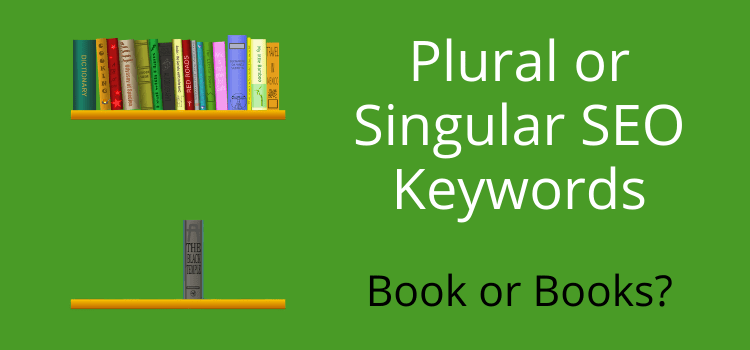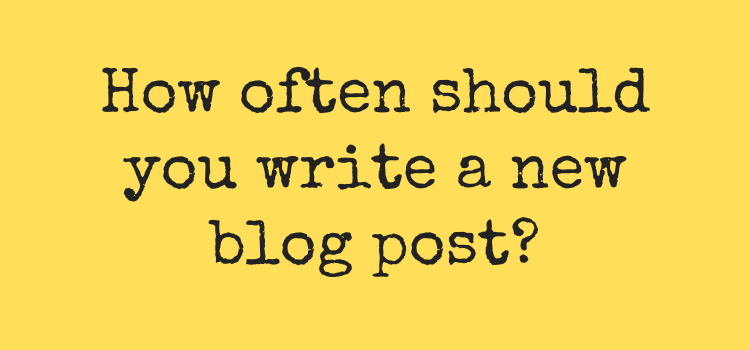
When you are trying to rank in search results on Google, you need to select relevant keywords. But when you select your keywords, do you think about singular and plural versions?
You might only know a little about search engine optimization (SEO).
But you understand that keyword research can help your blog posts and pages to appear higher in search results.
It doesn’t matter if you are promoting books or bicycles. Online marketing is vital for any product.
SEO plural or singular keywords?
If you are an author, you know you would never rank for the keywords book or books.
You would select a long-tail keyword that describes your book.
Let’s say you write romance stories set in England.
Perhaps a cozy English romance book would work well in search.
But would it make a difference if you use the plural form, cozy English romance books?
Look at the two images below for the search volume for each keyword phrase.


The singular keyword form returns around 5 million results.
But the plural version returns just under 11 million. That’s quite a difference.
When I used my keyword explorer to check both versions, the result was even more profound.


The plural keyword version has a reasonable monthly search volume of 14,300.
But the singular version didn’t return an exact match result for monthly volume without adding the word series to the phrase.
And even then, it estimated the monthly search volume at 1,000.
It doesn’t matter what product to are trying to promote.
Singular and plural keywords often produce different results in search queries.
Why are plural and singular keyword results different?
It is all about the intent of a search query.
It’s a common SEO strategy in content marketing to adapt to a user’s intent.
Some people are searching for information, while others are looking to make a purchase.
Search marketers sometimes categorize mobile users as being more inclined to be informational searchers.
But when there is an intention to buy, it is often a desktop or tablet user.
Singular and plural keywords fit into these two intentions.
When someone is looking for a new book to read, they will almost always use a plural search phrase.
If they used my example of cozy English romance books, they expect to find a listing of books that they can compare.
The singular form would only be useful if the reader wanted to find a specific book. Perhaps, a cozy English romance book by Mary Jones.
You could apply the same logic to electric scooters, camping tents, or Japanese teapots.
If you are selling on Amazon, your keywords work almost the same as Google or Bing.
You are trying to make sure your page ranks as high as possible in search queries.
So your choice and form of your keyword can make all the difference.
Google explains
Google’s John Mueller replied to a question asking if the search terms garden shed and garden sheds would be ranked differently.
Here is his answer.
“We would see those queries as being different. And when we see them as being slightly different, then we might think that one or the other of these pages makes more sense to show.
So usually with singular and plural, we do recognize that they’re synonyms, more or less.
But we also recognize that maybe there’s something kind of unique to one of them or to the other one.
Such as, if you’re looking for a plural, maybe you’re looking more for like a list or a comparison page or maybe a category page of different kinds of these items.”
Which is better, SEO singular or plural keywords?
When you stop to think about it, you probably use plural search terms more often.
When you want general information to compare, you might use search terms like free WordPress themes, best writing apps, blog topic ideas, or book promotion tools.
But when you want specifics, you might use how to write a prologue, where can I buy an electric scooter near me, or what is the best camping tent for kids.
You can see the difference in what you expect to find.
But there is no doubt that plural keywords appear to rank better.
So which one do you choose to help your ranking and online presence?
If I go back again to my example long-tail phrase for a romance author, the plural will work well if you have a series of titles.
Take a look at all my cozy English romance books. Or I have written a lot of cozy English romance books.
You could use both singular and plural versions of your keyword and see which one Google decides to index higher.
But what if you have only one book?
You need to be a little bit inventive. But you can use both forms with some creative writing.
If you include a quote from a review, it might read this is one of the best cozy English romance books I have read in a long time.
Or, if you are looking for cozy English romance books, this one might be for you.
Summary
It doesn’t matter whether it’s Google, Bing, Amazon, or social media.
You want to promote your products as best you can by getting your promotional pages, posts, and articles to rank as high as possible.
Everything starts with a user typing a search term on a search engine or social media platform.
Your choice of keywords is what is going to make all the difference.
Should you use SEO singular or plural keywords?
I think the correct answer is to use both if you can.
But clearly, SEO plural search terms appear to work much better.
Related reading: SEO For Ebooks Can Help You Sell More Books



